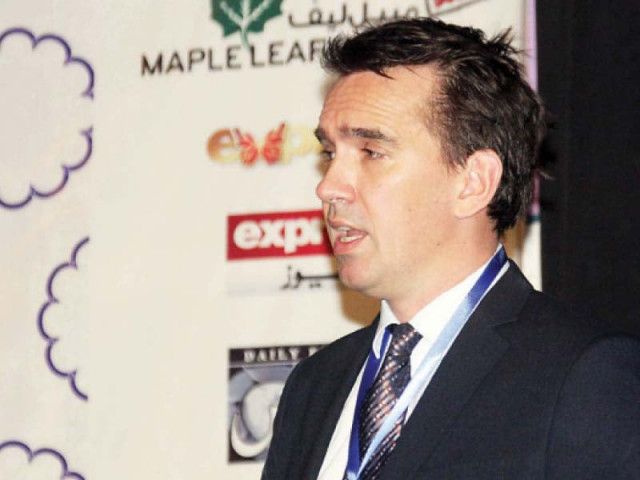Tête-à-tête: ‘West may once again become irrelevant to global affairs’
Frankopan says that the control of the Silk Roads had been central to the emergence of the British Empire

Professor Peter Frankopan had visited the city to speak about his new book Silk Road: A New History of the World at the Afkar-i-Taza festival. PHOTO :EXPRESS
There is a perception that what is now France was important to the Romans. However, the empire’s prestige had come from control of the upper Nile region and its relationship with the Persian empire towards the east.
These views have been expressed by Oxford University history professor Peter Frankopan.
His recent book Silk Road: A New History of the World highlights that Western Europe had been irrelevant to the great empires of the world for most of recorded history.
Frankopan says that Greek historians had focused their energies on studying Egyptian, Mesopotemian and Indus Valley civilisations.
He says his book is not just an attempt to highlight forgotten linkages of the West and the East but also to remind the reader that with time the rhythm and the relentless march of new ideas is bound to overtake the older ones.
Juxtaposing trade and power politics that had taken place along the famous Silk Road over a period of 2,000 years, Frankopan says he has tried to re-assess the importance of the route in the contemporary world.
If exploited properly through creation of a regional power bloc, he says, the routes could enable Southeast Asian states to once again make the West irrelevant in global affairs.
As a student, Frankopan says, he had not heard much about the Middle East and the Asia. “I had read up briefly on Samarkand or on the Mongols but I didn’t learn a lot about the region,” he says.
“Our world [the West] is very restrictive. It has never really attempted to explore states in the rest of the world some of which are now being categorised as emerging economies.”
Through his research, he says, he had been led to explore the Eastern regions that were once the ‘centre of the world’.
Explaining his motivation for writing the book, he says that, on one hand, he had wanted to better understand the process of emergence of Western Europe with the rise of Enlightenment ideas, industrial revolution and democratic form of government. On the other hand, he said, he had wanted to explore reasons that led to the downfall of the East in modern historical narratives.
Frankopan says that when he visited some markets in Lahore he was reminded of the importance of the East to world affairs.
He says that the control of the Silk Roads had been central to the emergence of the British Empire.
He says many eastern cities had been beneficiaries of global trade as there was a huge demand in Europe for spices, textiles and ceramics produced in the East. He says that many grand infrastructure projects like the construction of the Wazir Khan Mosque or the Lahore Fort undertaken in the region had been a result of globalisation brought about by increased trade activity.
The announcement of the China Pakistan Economic Corridor should be seen as a continuation of this 2,000-year-old process, he added.
He said emerging political developments signalled a shift in global affairs to a time when the West could once again become irrelevant, as it was until the 1500s.
“Pakistan has an incredibly important role to play. It has to deal with opportunities and challenges related to its strategic location,” he said.
For Frankopan, the openness of civilisations along the Silk Road to new ideas had contributed to its emergence as a route to power and prosperity. “Back then, it was okay to have multiple identities and to be fluid in one’s engagement with the world. We seem to have forgotten that in the 21st century.”
Published in The Express Tribune, April 9th, 2016.



















COMMENTS
Comments are moderated and generally will be posted if they are on-topic and not abusive.
For more information, please see our Comments FAQ